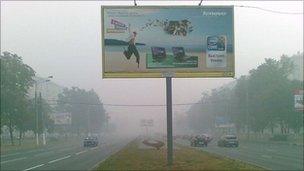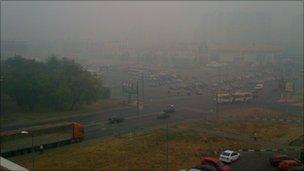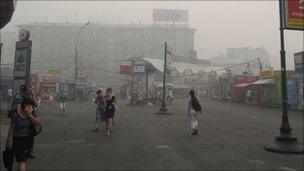Russian fires: Moscow residents talk about living in the smog
- Published
The thick blanket of smog that has shrouded Moscow as peat fires continue to burn just outside the city has worsened.
The smog has disrupted air traffic at two international airports in Moscow - Domodedovo and Vnukovo.
BBC News website readers in Moscow have been sending in their stories, pictures and videos of the smog.
Andrey Pozhalov, Moscow

The smog has been affecting the capital for a week. Photo: Andrey Pozhalov
There is no air to breath in Moscow. There is a smell of burning everywhere. Most offices switch off air-conditioning systems to prevent smoke flowing into the building, but the temperature immediately goes up.
The only way to survive is to wear a gauze bandage, but it doesn't help when you are in the street because it dries out in a few minutes.
I travel to work by public transport and this takes a long time because there are traffic jams. Apart from coming to work, I try to stay in doors as much as possible.
I have stopped going out jogging in the morning because it is just impossible.
John Harrison, Moscow

"We're going downstairs to the air conditioned supermarket to get a breath of clean air" Photo: Alexeeva Elena, Moscow
I have been in Moscow for three months. I have only been here for the summer, so missed the extreme winter. But this summer is terrible, it has only rained three times since I've been here, each time only for a maximum of 45 minutes.
The heat is unbearable and the smog is at its worst, we can get 50-100 metres visibility at best.
The Kremlin is 100 metres from our office and we can't even see that. We do have air con in the office but the smog is actually now getting through the system so there is even smog in the office.
It is holiday season at the moment so half the office is away on vacation.
Moreover, we've put it to the staff that they can go home - because the pollution is now at such a dangerous level. Pollution levels are in fact now 13 times their normal level.
The Moscow Times, external has reported that spending one hour outside is equivalent to smoking 60 to 70 cigarettes.
There is now no easy way of getting out of the city. There are a couple of fires within 50km of the city's boundaries.
We're all starting to get a bit concerned. This is not good for our health - it is painful to the lungs to go outside. I am a smoker but I can barely even smoke at the moment.
I'm meant to be going back to the UK in two weeks but I'm not sure how to get out of the city. Getting a hire car could mean driving through fires.
Eugenia Vinogradova, Moscow
I am at home now, looking through the window. The air looks like thick fog and I can barely see anything further than 20 metres away.
Usually I open the balcony door when it gets too stuffy, but now I prefer to keep it closed because of the acrid smog embracing the city. I live in the south-east of Moscow, which is severely affected by the smog.
My job as a translator means I can stay at home, but many people are forced to go out and breath in this poisonous air, pregnant women included.
My apartment windows face the highway and rows of cars are moving slowly as if in a heavy downpour.
I try not to watch TV reports too much, because all they bring are new details of more destroyed villages or stories of people suffering, and that is hard to see.
I have had to change the way I live, for instance, I drink three or four times more water than I used to. I take a shower every three hours, and before going to sleep I wet sheets and wrap them around myself to stay cooler.

People out near Ulitsa 1905 Metro station try to avoid breathing in smog. Photo: James Blake
My apartment doesn't have an air conditioning so I have to keep cool however I can, and I only go out if it is an emergency.
Today, for example, I went to the grocery store to buy some food, it's located relatively close to the house I live in (may be 150 metres away), but the distance actually seemed like kilometres.
It is not easy to breath and I tried to hold my breath as often as I could. The unhealthy smog makes my eyes sore, it feels as if you are standing close to a fire but cannot get away from it.
Hopefully, my parents aren't affected much by the smog, they live in the Tver region (150km to the North of Moscow).
I pray this disaster will come to an end soon.
- Published6 August 2010
- Published5 August 2010
- Published4 August 2010